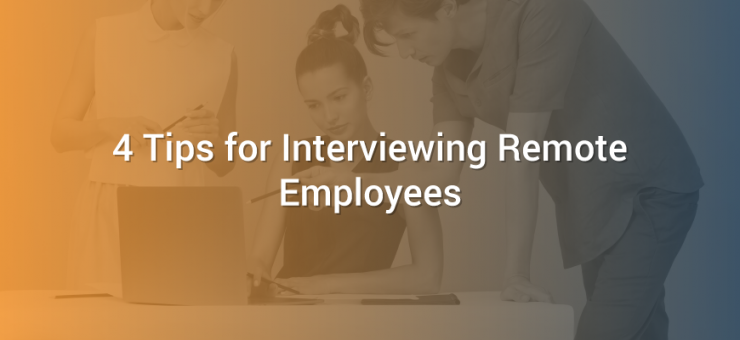In the modern digital world, it’s no secret that remote work is exploding in popularity. Within just a few short years, the percentage of flexible or remote work has skyrocketed. Remote work boasts the promise of flexibility and freedom for employees and employers alike. Benefits of increased productivity, reduced expenses and a broader candidate pool entice companies, but learning how to navigate within this new business structure can be difficult. In particular, interviewing and hiring remote employees requires your team to learn a new set of skills. As you can imagine, conducting remote interviews brings along a few technical and logistical complications. If your team is interested in starting to conduct remote interviews but are unsure where to begin, start by following these tips:
Come Prepared
While coming prepared is advice that is frequently given to job seekers before an interview, it is just as imperative for interviewers. Similarly to how you would prepare to be interviewed, research your candidate and be familiar with the position you’re interviewing them for to prepare appropriate questions. Keep in mind that you’re trying to find out if your candidate will be a good employee and also a productive remote employee. Because a certain level of trust needs to exist between management and their remote workers, be sure to ask meaningful questions that give you a glimpse into your interviewees’ experience in remote positions, work ethic, and communication style. For an added benefit, consider requiring all candidates to take a personality test to determine their work tendencies and what motivates them.
Utilize Technology
When it comes to conducting remote interviews, using the right technology and tools is critical for success. After all, technological failures can make your company appear unprepared, unorganized and unprofessional. This is especially important when considering the reliance on technology remote employees have and the expectations they’ll hold for a new company to provide reliable tech. To create the most personal connection possible with your remote interviewees, conduct live video interviews. This way, you can mimic a face-to-face meeting as closely as possible so you can build a closer relationship and gauge facial expressions. Using a video interviewing platform that allows live video interviews to be recorded gives you the ability to reference specific questions or conversations after the fact and collaborate with other members of the hiring team. To further show your prospective employees the extent of your technology acumen during the hiring and interview process, utilize a unified communications platform. This type of platform allows you to use multiple different communication channels, such as instant messaging, video conferencing, email, phone lines and more, in one place to help keep yourself organized and concise.
Listen With Intent
While using communication tools such as video to conduct remote interviews, demonstrating active listening can be difficult. The diminished body language and eye contact makes it critical to find other ways to show that you are truly listening. Tips for portraying active listening via technology include recapping key points to their comments, asking questions, avoiding talking over your candidate, and staying focused on your screen. By doing these things, you’ll be able to show your candidate that you are interested in what they’re saying, want to hear more, and care about their answers. End all remote interviews with a recap of what the discussion was to make your prospective employee feel appreciated and eager to join your company. If you fail to do these things, your candidates could become uninterested and off-put, leaving your company at the bottom of their dream organization list.
Check References
Another tip that’s especially true for remote interviews is asking for references from their previous positions, rather than family or friends. Managers are ideal references because they have prior knowledge of an employee’s work, independence and motivation. Co-workers also provide insights into your candidate’s ability to work as a remote member of a team and communicate. If your candidate is interviewing for an entry-level position and has little to no industry experience, ask for references from volunteer positions, teachers, academic advisors, or supervisors from any part-time jobs. Follow up with all references provided to verify if a candidate sounds as good as on paper or in an interview. In the end, it’s extremely valuable to have others confirm their capabilities to know you’re making the right decision in hiring them.
Overall, remote interviews don’t necessarily need to be that much different from in-person interviews, as long as you’re equipped with the right knowledge and technology. By making sure your technology is ready to work as hard as your hiring team does, you’ll be in a good position to employ the best candidates for your open remote positions.











